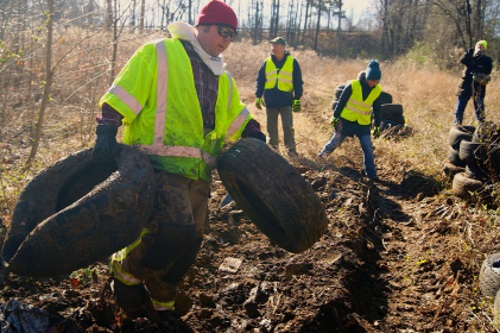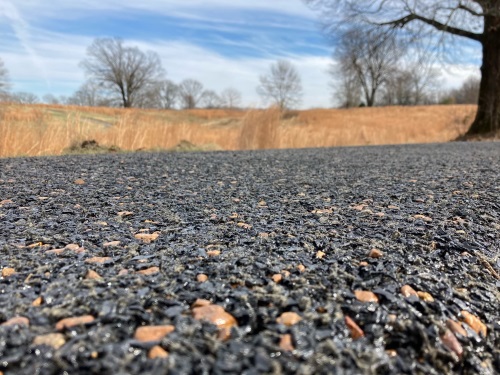An eyesore of thousands of dumped tires were recently recycled into material for a hard-surface walking and biking trail at the Tennessee state park in Memphis they once littered, thanks in part to a grant from the Tennessee Department of Transportation.
[Above photo by the Tennessee DOT]
The Tennessee DOT and Tennessee State Parks recently opened the 2.5-mile-long walking and biking trail at T.O. Fuller State Park in Memphis. Billed as one of the longest rubber-bearing trails in the country, the new trail is primarily composed of 24,000 recycled tires.
Tennessee DOT issued a $200,000 litter grant to support the trail project, which shredded those 24,000 abandoned tires into quarter-inch pieces of crumb rubber. A federal recreational trails program provided another $280,000, with the Tennessee Department of Environment and Conservation or TDEC providing an additional $250,000 grant.
“Litter and illegal dumping are costly and damaging to Tennessee,” explained Joseph Galbato, III, who until recently served as Tennessee DOT’s interim commissioner, in a statement.
[In May, Governor Bill Lee (R) appointed Deputy Governor Butch Eley to serve as the agency’s commissioner in addition to Eley’s current duties.]
“We are thankful for collaborative partnerships like the ‘Tires to Trails’ project which not only addresses the litter problem but turns it into a meaningful and positive long-lasting resource for the community,” Galbato added.

The crumb rubber from the old tires – mixed with a rock aggregate and a polyurethane binder – does not include the metal from those tires, noted Brent Miller, manager of Patriot Tire Recycling in Bristol, TN.
Typically, recycled tires are shredded and used as fuel stock for power plants and paper mills, or made into doormats, he explained.
“This was the first time we’ve done a trail,” said Miller, whose company handles about a million tires a year.
Recycled tires can live a useful second life in some transportation applications. The crumb rubber creates a flexible roadway that resists cracking, requires less maintenance, and is easier on the feet of walkers and joggers, said Alle Crampton, environmental scientist, and manager of the Tire Environmental Act Program for the state.
The walkways also are porous, virtually reducing the stormwater runoff problems associated with concrete and asphalt. The water can soak through the trail and reach the root systems of trees, making it less likely that the root systems will expand and crack the walkway, Crampton said.
More than 400 volunteers collected the passenger, commercial truck, and heavy equipment tires from the park, with many of the volunteers coming from Tennessee DOT, TDEC, the City of Memphis, Shelby County, and Memphis City Beautiful.
T.O. Fuller State Park was the first state park open for African Americans east of the Mississippi River. Originally built in 1938, the state later renamed the park in honor of Dr. Thomas O. Fuller, a prominent African-American educator, pastor, politician, civic leader, and author.

